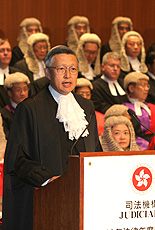 |
| Mediation trial: Chief Justice Andrew Li says the Government has agreed to a one-year trial project that will provide legal aid for mediation in the matrimonial field. |

|
The Government has agreed to a one-year trial project that will provide legal aid for mediation in the matrimonial field, Chief Justice Andrew Li says.
Speaking at the Ceremonial Opening of the Legal Year 2005, Mr Li said the decision follows a recommendation from the working party on civil justice reform in its final report.
"Mediation is becoming established in many common law jurisdictions as an effective alternative method of dispute resolution. One of the important recommendations of the final report is that, subject to further study by the Administration and consultation, the Legal Aid Department should have power in suitable cases to grant legal aid for mediation," he said.
The Judiciary gained useful experience in mediation in the matrimonial area through its own pilot scheme between 2000 and 2003. That scheme was successful, Mr Li noted, with a high rate of settlement resulting from consensual mediation.
"The research team at the Hong Kong Polytechnic University which assessed the scheme concluded that mediation has a place in resolving family disputes and recommended that parties should be encouraged to use it as far as possible," he said.
"The Administration's present pilot scheme will operate for one year. It will be modelled on the Judiciary's pilot scheme and there is every reason to believe that it will achieve similar success. After that scheme has been operated and assessed, the provision of legal aid for mediation in all suitable cases at the discretion of the Director of Legal Aid should be considered."
Mr Li believes providing legal aid for mediation would achieve savings for the public purse. It also has a considerable social benefit "in bringing about a more satisfactory resolution of disputes for the parties with less stress in the process."
Justice must be maintained despite cutbacks
From the years 2002-3 through 2006-07, the Judiciary, like other government units, is facing a reduction of just under 14%. It has adopted many coping strategies, Mr Li said.
"The number of deputy judges will be reduced and some judicial posts will be left vacant. Capital projects have been shelved and two Magistracies have been and one more will be merged with others, resulting eventually in Magistracies in six locations instead of nine originally. At the same time, there has been considerable re-engineering in Judiciary Administration with the deletion of posts and the streamlining of tasks and procedures," he said.
Where possible, resources will be redeployed to increase judicial manpower temporarily in areas facing particularly great pressure, he said. He acknowledged judges and their support staff have been under great pressure, and commended them for their efforts.
Wait times for hearing dates likely to lengthen
"Despite budgetary constraints, the quality of justice must not be compromised and must be maintained," he stressed.
"It must be recognised by all concerned that the inevitable consequence of budgetary constraints over a period of time will be that the waiting times will be lengthened at all levels of court. It will take a longer time to obtain a hearing date.
"It is my duty to explain this plain fact frankly to the community. If there comes a point of time when the waiting times are considered to be unacceptable, the question of providing additional resources to the Judiciary will have to be raised and addressed by the Administration and the Legislature."
Civil justice reform review suggestions to be implemented
The working party on civil justice reform's final report provides a blueprint for reforming Hong Kong's judicial system, to make it more efficient and cost-effective. While Mr Li welcomes its recommendations - which enjoy widespread support - he expects it will take two to three years to implement them.
"The challenges posed by and the work involved in implementation must not be underestimated. Primary and subsidiary legislation have to be drafted and piloted through the legislative process. The information technology system has to be revamped and enhanced. And extensive training of judges and supporting staff will be involved," he said.
Labour Tribunal to have more suitable location
Another working party's report on the Labour Tribunal recommended its relocation to the South Kowloon Magistrates' Courts Building. By 2007, this move should be complete. It will result in substantial savings for the public purse, Mr Li said, noting the costs for conversion and refurbishment would be offset by substantial saving in rental.
"The Tribunal has for some years been operating in a commercial building. This is a highly unsatisfactory state of affairs. Apart from various operational deficiencies, such a location blurs its image and lowers its esteem as a court."
Solicitors' rights of audience may be extended
In response to ongoing calls for an extension of solicitors' existing rights of audience that would enlarge the pool of advocates available to the public, Mr Li has appointed a working party chaired by Mr Justice Bokhary to look into the matter.
"A most important facet is that there must be the highest standards of advocacy before the courts. This is essential to the administration of justice in an adversarial system. Another most important facet of the public interest is that there should be a strong and independent Bar," he said.
"A few years ago, I considered it premature to explore this matter. However, I think that it is now appropriate to study the subject."
The working party membership comprises judges, barristers, solicitors, a law officer and a lay person. It will undertake appropriate consultation in due course.
Go To Top
|



